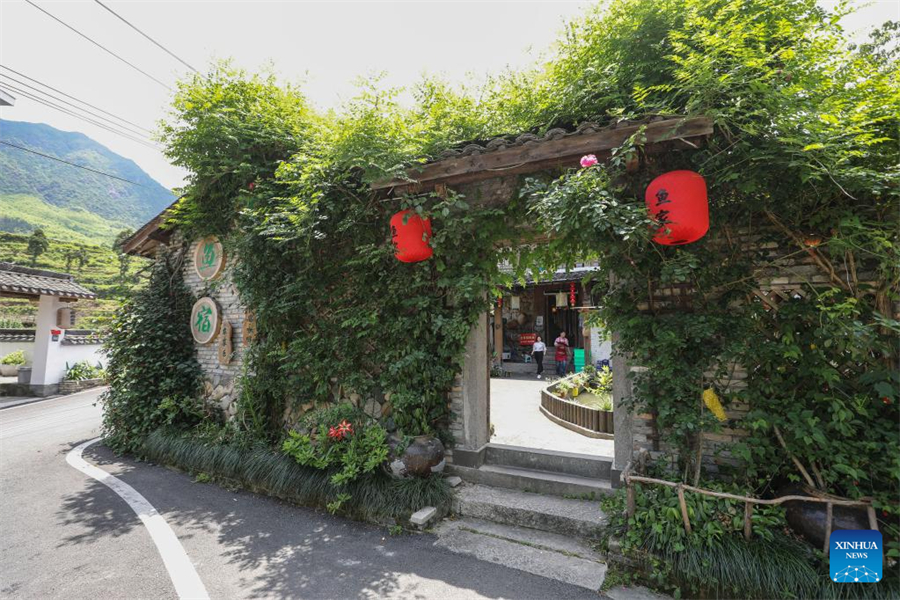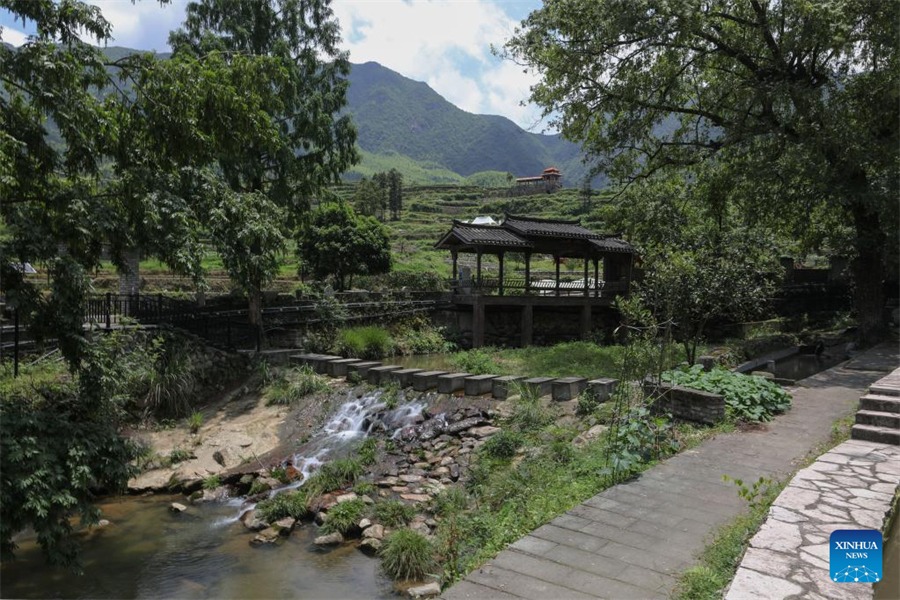Agriculture heritage system revives China's "United Nations village"

This photo taken on May 25, 2023 shows a view of a farm stay in Longxian Village of Qingtian County, east China's Zhejiang Province.[Xinhua/Du Xiaoyi]
by Xinhua writers Ye Ting, Zhu Han
HANGZHOU -- Longxian Village, dubbed a "United Nations village" for the number of emigrants from the village, has embarked on the path to shared prosperity by tapping into its unique agriculture heritage system.
The Qingtian County in east China's Zhejiang Province, where the village is located, features not only a renowned hometown of overseas Chinese but is also the representative site location of the rice-fish co-culture system.
Entering the village, one may see almost every household displaying the national flag of the country where a family member resides, alongside the Chinese national flag.
The walls of houses are adorned with signs that read "home of overseas Chinese," listing the names of family members who have gone abroad, their host countries, the year of emigration, and their respective professions.
The numerous flags, resembling a micro-United Nations, demonstrate not only the arduous journey of the emigrants from the village in the early years but also how a brand-new life has now unfolded before the residents as they give full play to the precious rice-fish co-culture system.
The rice-fish co-culture system features an ecological symbiosis where fish provide fertilizer to rice, regulate micro-climatic conditions, soften the soil, disturb the water, and eat larvae and weeds in the flooded fields while rice provides shade and food for fish, according to the Food and Agriculture Organization (FAO) of the United Nations.
The system has tremendous potential for increasing food security and alleviating poverty in rural areas. It was listed on the Globally Important Agricultural Heritage Systems (GIAHS) by FAO in 2005.
The villagers of Longxian are now preparing to release thousands of fish fry into the rice fields in June.
As the core protection zone of the rice-fish co-culture system, Fangshan Town, where Longxian Village is located, has developed a distinctive and diversified rice-fish industry development model with a focus on the system.
Nowadays, Longxian Village is more of a world of fish. Ponds and rice fields are scattered everywhere, and regardless of the water depth, fish are being raised.
The area dedicated to rice-fish cultivation in the village covers 495 mu (about 33 hectares), and the fish yield per mu has risen to nearly 50 kg now.
With the support of the industry, the villagers see a growing income. "Our reputation has grown, and people from all over the country and even abroad come to our village in groups," said Wu Lizhen, a villager who, along with her husband, earns a living by raising fish, making dried fish, and running a farm stay.
Within a few years, they built a small villa, bought a car, and even bought an apartment in the county seat. They can earn over 1 million yuan (about 141,300 U.S. dollars) per year at the most.
Wu Yongqiang, a villager in his 50s, opened the first guesthouse in the village in 2019.
"Nowadays, many tourists come to our village for sightseeing and vacationing. Dishes like braised field fish and stir-fried rice noodles with dried fish in our restaurant are highly popular," said Wu Yongqiang, who estimated that his annual income from the guesthouse and agritainment reaches 350,000 yuan.
In recent years, the village has further capitalized on its cultural resources by launching research and study camps, exhibition halls and high-quality guesthouses.
This has effectively promoted the deep integration of agriculture, culture, commerce and tourism, significantly boosting income for farmers.
Members of the Communist Party of China and officials of the village have established an alliance for the rice-fish co-culture industry. They provide unified packaging and shelving for farmers' rice products and offer 24-hour self-service sales. Tourists can simply scan the QR code and make payments to obtain the products.
"During the peak sales season, we help farmers sell about 5,000 kg of rice per week. Last year, the alliance helped more than 80 households increase their income by over 2 million yuan in total," said Wu Liqun, Party secretary of Longxian Village.
"In the past, we left the mountains and ventured out into the world to make a living. In recent years, we have tapped into unique agricultural heritage resources. Villagers have become richer. Many emigrants have chosen to return to their hometown," said Wu Liqun.

This photo taken on May 25, 2023 shows a view of Longxian Village of Qingtian County, east China's Zhejiang Province. [Xinhua/Du Xiaoyi]

This photo taken on May 25, 2023 shows a view of the rice-fish co-culture system in Longxian Village of Qingtian County, east China's Zhejiang Province. [Xinhua/Du Xiaoyi]
























